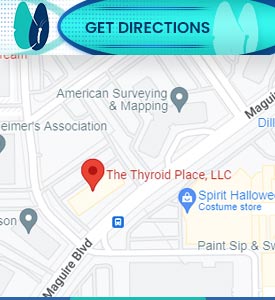Living with a Thyroid Disorder: Coping and Management
Thyroid disorders encompass a wide range of conditions that cause the gland to produce either too little or too much thyroid hormone (hypothyroidism or hyperthyroidism). Thyroid disorders can have an impact on your heart rate, state of mind, strength, metabolism, bone health, pregnancy, and many other functions. Dr. Ruben Valdes, DC at The Thyroid Place, offers effective diagnosis and management to individuals suffering from a variety of thyroid disorders. For more information, contact us or schedule an appointment online. We are conveniently located at 1555 Howell Branch Rd, Suite A-1 Winter Park, FL 32789.


Table of Contents:
Can you live a normal life with thyroid problems?
How does thyroid disorder affect your daily life?
What is the average age for thyroid problems?
What does thyroid fatigue feel like?
While there are several types of thyroid disorders, the most common conditions include hypothyroidism (insufficient levels of the thyroid hormone being produced) and hyperthyroidism (the overproduction of the thyroid hormone), both of which will result in full-body symptoms and require long-term management.
Thyroid problems will likely require you to continue receiving regular medical treatment for the rest of your life, but this treatment will help to make the thyroid condition manageable. With proper management, patients will be able to lead a somewhat normal, healthy life as the symptoms will be reduced as much as possible for their condition. It is likely that the condition will sometimes take more out of you as thyroid problems will most often affect the energy levels and mood of the patient, so it is incredibly important to make sure that you have access to quality medical care to continue receiving proper treatment as required. Maintaining a healthy lifestyle through a balanced diet and regular exercise, while also taking any recommended medications or following through with recommended treatments will ensure that you are able to continue living a normal, comfortable life.
Thyroid disorders can cause symptoms that are experienced throughout the entire body, including dry, thickening skin, thinning of hair throughout the entire body including on the head, problems with constipation or changes in the menstrual cycle, and much more. It is also very common to experience psychological symptoms due to thyroid disorders, including mental health conditions such as depression as well as regularly experiencing feelings of fatigue, restlessness, and general brain fog. Many patients with thyroid problems will experience changes in their weight as well, both gaining and losing weight.
There is treatment and management available to prevent these symptoms from interfering with a patient’s daily life as much as possible, but those with thyroid problems will likely have to make lifestyle changes to properly manage their condition. Some of these lifestyle changes may include avoiding specific foods depending on the type of thyroid condition, with it being common for those with hyperthyroidism often being recommended to avoid foods that are high in iodine, including egg yolks, fish, shellfish, and dairy.
Thyroid problems can start to develop for any person at any age, however, they are more likely to occur among the aging population. Hypothyroidism is the most common thyroid problem among those who are 60 years of age and older, and the prevalence of the condition continues to increase among the aging population. Conditions leading to an overactive thyroid are far more common among those assigned female at birth and will often develop when patients are between 20 and 40 years of age. While it is far more common among older adults, thyroid problems do occur in children sometimes as well, with studies showing that around 3 to 4% of children are diagnosed with thyroid disease. Hypothyroidism can be a congenital condition as well, meaning that some babies are born with the condition so newborn screenings performed at birth will include checking for it. It is also common for hypothyroidism to develop in late childhood or sometime throughout adolescence.
Fatigue due to thyroid problems can be quite debilitating, quickly interfering with your ability to make it through the day. It is distinguished from just general fatigue or suffering from poor-quality sleep in that it is often described as much more intense than full-body exhaustion. Many patients suffering from thyroid problems will find it difficult to get through the day without having a nap even if they have been sleeping for longer during the night and will continue to feel completely exhausted when they are awake. It is also very common to lack sufficient energy to exercise and to fall asleep during the day and very quickly at night. Those who have thyroid problems often describe difficulties getting out of bed in the morning due to their extreme levels of fatigue. These incredibly low levels of energy very often lead to a lack of motivation and feelings of depression as fatigue continues to interfere with one’s ability to function on a daily basis.
Whether you feel you have a thyroid condition or are seeking another opinion, Dr. Ruben Valdes, DC at The Thyroid Place will collaborate with you to uncover the underlying cause of your thyroid disorders and determine the most effective treatment to help you return to pre-thyroid disorder condition. For more information, contact us or schedule an appointment online. We are conveniently located at 1555 Howell Branch Rd, Suite A-1 Winter Park, FL 32789. We are serving clients from Winter Park, FL, Orlando FL, Maitland FL, Altamonte Springs FL, Longwood FL, Goldenrod FL, Alafaya FL, Fairview Shores FL, Lockhart FL, and across the state of Florida!


Additional Services You May Need
▸ Hypothyroidism Treatment
▸ Nutrition Guidance
▸ Functional and Integrative Medicine
▸ Laser (LLLT) Assisted Weight Loss
▸ Low Thyroid Function Treatment
▸ Low-Level Laser Therapy for Low Thyroid
▸ Zerona Z5 For Weight Reduction
▸ Cold Laser LLLT For Hair Growth
▸ Thyroid Nodules Treatment
▸ Thyroiditis Treatment
▸ Functional Medicine Health Coaching



